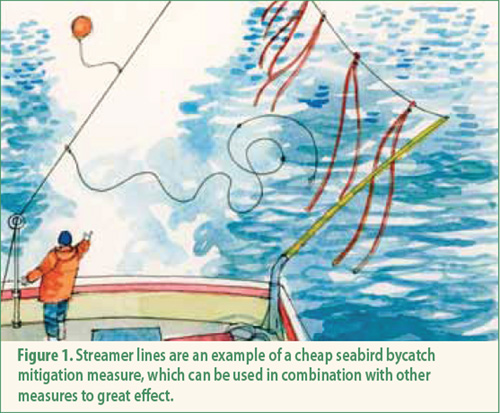The 2010 meeting of the Standing Committee on Research and Statistics (SCRS) of the International Commission for the Conservation of Atlantic Tunas (ICCAT) took place from 4-8 October in Madrid, Spain. One of the aims of the meeting was to review and finalise the work of the various sub-committees and species groups that report to the SCRS.
Seabird bycatch and the collection and reporting of bycatch data by observer programmes have received increased attention within ICCAT's Sub-Committee on Ecosystems (SC-ECO) over the last few years. A formal assessment of the impacts of ICCAT fisheries on seabirds was presented at the 2009 inter-sessional meeting of the SC-ECO (click here).
After considering the results of the assessment and other seabird bycatch papers presented, the 2009 SC-ECO concluded that ICCAT fisheries have measurable impacts on some seabird populations, including several that are threatened with extinction, and that minimising seabird mortality in ICCAT fisheries could result in improved population status and reduced conservation concerns. The SC-ECO therefore recommended that ICCAT's current binding measure (Recommendation 07-07) regarding seabird bycatch mitigation (click here and scroll to page 98) be strengthened to require the use of a combination of mitigation measures that include bird-scaring (tori) lines and line weighting as a minimum. This recommendation was endorsed by the SCRS and presented to the ICCAT Commission at its meeting in November 2009.
Several proposals to strengthen Recommendation 07-07 were submitted by ICCAT Contracting Parties at the Commission meeting in 2009. However, consensus on strengthening the current Recommendation was not then reached.
The matter was discussed again at the 2010 inter-sessional meeting of the SC-ECO, where a number of seabird papers was presented, including three ACAP papers by the Vice-Convenor of ACAP's Seabird Bycatch Working Group, Anton Wolfaardt. Updated results from a number of ongoing studies were reported, and highlighted again the importance of using a combination of effective mitigation measures to reduce seabird bycatch. The increased importance of line weighting to ensure that baited hooks sink rapidly and remain within the protection of bird-scaring lines was emphasised. On the basis of the presentations and discussions, the 2010 SC-ECO reaffirmed its recommendation from 2009 that Recommendation 07-07 on seabird bycatch mitigation should be strengthened.
Current research into optimal line-weighting configurations will hopefully provide information which can be used to inform a formal proposal to strengthen Recommendation 07-07 in 2011.
The 2010 SC-ECO (click here for its report) also recommended that a minimum observer coverage level of 5-10% across all ICCAT fisheries be implemented, and that funds be made available to appoint a full time bycatch coordinator. These recommendations were endorsed by the SCRS at its meeting in early October 2010, but still need to be adopted by ICCAT's Commission at its 17th Meeting, to be held in Paris, France next month (click here for the agenda).
The draft report of the meeting of the 2010 ICCAT Standing Committee on Research and Statistics may be found at http://www.iccat.int/Documents/Meetings/Docs/2010_SCRS_ENG.pdf.

With thanks to Anton Wolfaardt, Vice-Convenor, ACAP Seabird Bycatch Working Group.
John Cooper, ACAP Information Officer, 23 October 2010

 English
English  Français
Français  Español
Español